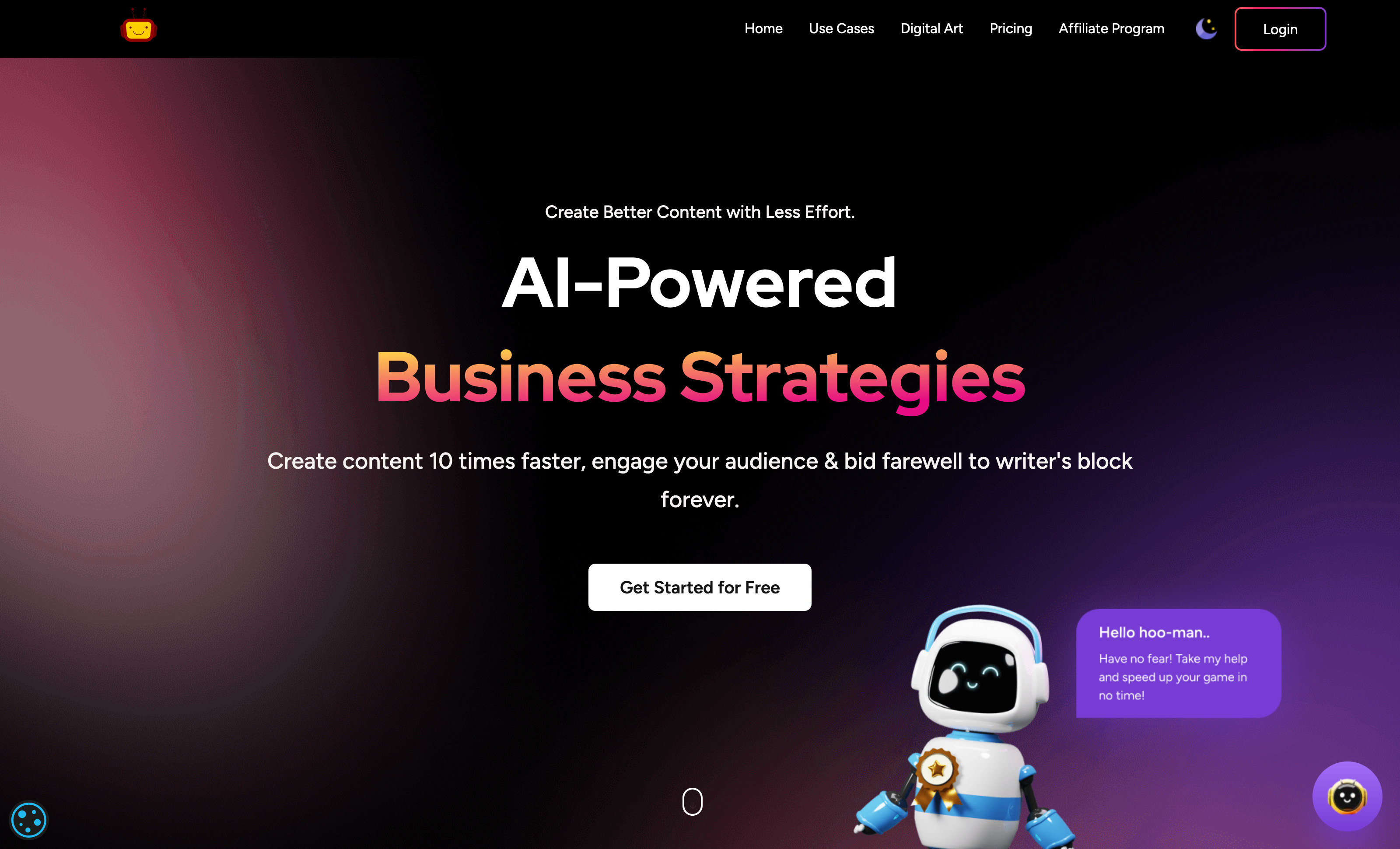
By Everneed AI Team
AI Use Cases in E-Commerce: Case Studies Highlighting AI in Action
Artificial intelligence (AI) has lately been a main factor behind the expansion and effectiveness of e-commerce companies. From improving consumer experiences to simplifying logistics, artificial intelligence is enabling online stores to more precisely run their business and boost income. By means of real-world case studies, this paper will investigate many application cases of artificial intelligence in e-commerce, therefore highlighting how AI solutions are used in several facets of online retail.
Case Study 1: Amazon’s AI-Driven Personalization
Challenge:
With a more customized shopping experience, Amazon—the biggest e-commerce platform in the world—was hoping to boost consumer involvement and raise sales.
AI Solution:
Amazon created a recommendation engine driven by artificial intelligence that examines consumer preferences, browsing habits, and prior purchases. The system creates very precise product suggestions for every user in real-time by applying machine learning techniques.
Outcome:
The AI-powered recommendation engine developed by Amazon has changed the platform significantly. These tailored recommendations seem to be behind up to 35% of Amazon's purchases. Consumers get recommendations based on their tastes, which makes buying more relevant and fun; Amazon gains from greater interaction and bigger sales volumes.
Key Takeaways:
Personalization driven by artificial intelligence may greatly increase consumer involvement and sales.
Customized suggestions made possible by machine learning techniques guarantee that consumers discover items fit for their preferences.
Case Study 2: Everneed AI: Enhancing Customer Support with AI Chatbots
Challenge:
Everneed AI's online retailer battled with handling a lot of consumer questions, especially during busy shopping seasons. The business required a quick approach to offer 24/7 customer assistance without straying their support staff too far.
AI Solution:
Using Everneed AI's chatbot tool, the shop was able to automatically answer often asked questions such order tracking, return policy, and product availability. Designed to answer questions in real-time, the chatbot gave consumers fast and accurate information.
Outcome:
The business's customer service burden dropped 60% once the chatbot was put in use. The chatbot effectively answered most questions, freeing human agents to concentrate on more difficult problems. Faster response times helped consumers, and the business raised general efficiency.
Key Takeaways:
AI chatbots may substantially lighten customer support professionals' labor.
Responding to regular questions automatically enables companies to offer quicker, more consistent customer service.
Case Study 3: Zalando’s AI-Powered Fashion Recommendations
Challenge:
Major European online clothes retailer Zalando sought to boost user involvement by providing tailored wardrobe advice. Without depending just on hand labeling and classification, the corporation wanted a method to provide clothing that suited personal style preferences.
AI Solution:
Using machine learning to examine consumer preferences, past purchases, and browsing behavior, Zalando put an AI-powered recommendation engine into place Offering a "complete the look" function that couples things together, the system also considers present fashion trends and customizes recommendations for every consumer.
Outcome:
The AI-powered method produced a 20% rise in consumer interaction as more people spent more time looking over the suggested products. Zalando's conversion rates rose as consumers were more inclined to buy recommended ensembles appropriate for their style.
Key Takeaways:
By providing tailored purchasing experiences, artificial intelligence fashion suggestion engines may improve consumer involvement.
Machine learning systems examine consumer patterns and data to recommend pertinent clothing or accessories.
Case Study 4: The North Face: Conversational AI for Product Discovery
Challenge:
Leading outdoor gear store The North Face sought to enhance its product discovery process by providing a more dynamic and interesting experience for internet buyers. The intention was to assist consumers in selecting appropriate gear depending on their particular requirements and preferences.
AI Solution:
Working with IBM Watson, The North Face created a conversational artificial intelligence platform leveraging natural language processing (NLP). By responding to inquiries about the sort of gear they are searching for, the weather, and their intended activity, customers may engage with the artificial intelligence. After that, the artificial intelligence offers customized product suggestions depending on consumer feedback.
Outcome:
The conversational artificial intelligence system raised consumer satisfaction and enabled faster and simpler product searches. Consumers valued the interactive experience, and The North Face noticed a rise in sales as the AI generated very pertinent product recommendations.
Key Takeaways:
By providing tailored suggestions depending on consumer preferences, conversational artificial intelligence may improve product discovery.
Platform driven by natural language processing provide more interesting and natural interactions with online consumers.
Case Study 5: H&M’s AI-Powered Inventory Management
Challenge:
Inventory Management Problem: Managing thousands of stores all over presented difficulties. The business wanted a way to maximize inventory levels and prevent running out of popular products or overstocking.
AI Solution:
Using machine learning algorithms to forecast demand depending on sales data, fashion trends, and seasonal variables, H&M installed an AI-driven inventory management system. The system guides the retailer on inventory control in every store and item reordering timing.
Outcome:
The AI-powered inventory control system of H&M greatly decreased stockouts and overstocking incidence. Maintaining more effective inventory levels helped the shop to have reduced running costs and more profitability.
Key Takeaways:
AI-driven inventory control lets stores maximize stock levels and cut running expenses.
Based on several data sources, machine learning techniques can fairly forecast demand.
Case Study 6: Sephora: AI-Powered Virtual Assistants for Personalized Shopping
Challenge:
Sephora, a worldwide cosmetics company, sought to provide its consumers—online and in-store—a more tailored purchasing experience. The business wanted a means to help consumers choose the appropriate items depending on their skin type, preferences, and makeup requirements.
AI Solution:
Sephora unveiled virtual assistants driven by artificial intelligence, including Sephora Virtual Artist and Color IQ. These devices suggest cosmetics based on consumer skin tone and preferences using artificial intelligence. Sephora Virtual Artist also lets consumers visually test cosmetics using augmented reality (AR) technology.
Outcome:
By providing tailored suggestions and a more engaging shopping experience, Outcome's AI-powered solutions raised consumer happiness. Customers felt more confidence buying goods after viewing how they would appear, hence the virtual try-on tool helped to increase internet sales.
Key Takeaways:
AR technology and artificial intelligence-powered virtual assistants may produce quite customized shopping experiences, hence boosting client confidence and sales.
Providing interactive AI solutions—like virtual try-ons—improves the online buying experience for stores of beauty and fashion.
Conclusion
By providing creative ideas that boost personalizing, simplify processes, and increase client involvement, artificial intelligence is changing the e-commerce scene. From sophisticated inventory management and virtual assistants to AI-powered chatbots and recommendation engines, the uses for artificial intelligence in e-commerce are many and expanding.
Combining artificial intelligence capabilities can help companies lower expenses, improve general customer experience, and boost productivity. AI is enabling e-commerce companies to flourish in a market growingly competitive by improving product suggestions, streamlining inventories, or providing individualized customer service.
Investing in AI technology like Everneed AI will help online stores trying to keep ahead simplify their processes and raise profitability and customer happiness. These case studies demonstrate how clearly artificial intelligence innovation will shape e-commerce going forward; now is the time to use these potent tools to expand your company.

Author
Share on:
Related posts





